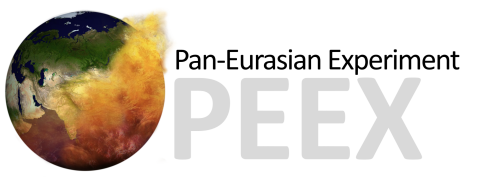Infrastructure development for assessing air quality in the Moscow megalopolis (RI-URBANS-MSU, 2021-2023)
Research project led by PEEX collaborating partner – the Moscow State University (MSU; https://english.spbu.ru) – is the Russian Sister Project to the EU Horizon-2020 RI-URBANS project (Research Infrastructures Services Reinforcing Air Quality Monitoring Capacities in European Urban& Industrial AreaS; 2021-2025; https://riurbans.eu) coordinated by the Spanish National Research Council (Spain) and the University of Helsinki (Finland).
The Moscow city is one of the largest megacities in the world with a high population density, a developed transport, thermal power and industrial infrastructure (that uses natural fuels – gas, diesel, gasoline), which is accompanied by large volumes of aerosol pollution emissions into the atmosphere. The development of large cities with a high population density requires an urgent comprehensive solution to environmental problems and the development of a network of stations for continuous monitoring and analysis of the state of the environment and air quality. The project is focused on a comprehensive analysis of aerosol air pollution and assessment of the ecological state of the environment, guided by the modern approaches and methods of the European RI-URBANS project, and to be implemented for the first time in the Moscow megapolis for high-tech air quality monitoring with modern infrastructure technologies.
Russian Sister project main goal: to establish research infrastructure (RI) – for continuous monitoring and analysis of aerosol pollution in the atmosphere of the Moscow megapolis – functioning on a basis of modern technologies developed in European centers for the air quality monitoring and elaborated instrumental and complex measurements and modelling tools creating a science-based systematic analysis of air quality in the megapolis.
Main objectives: (i) to assess air quality in the Moscow megapolis and contribution of sources to air pollution; (ii) to provide air quality monitoring infrastructure using advanced technologies and tools, integrated measurements and modeling; (iii) to increase capacity for assessing and predicting air quality in the Moscow megapolis and to support decision-making by authorities for reducing urban air pollution in cities.
Main tasks:
(1) to develop and establish the instrumental Aerosol Complex of the Moscow State University based on the world standards of the Global Atmospheric Watch (GAW) Observing System;
(2) to adapt methodology and experience of RI-URBANS Partners in monitoring air quality at GAW stations and European RI networks;
(3) to create instrumental base of the MSU’s Aerosol Complex for measurements and analysis of microphysical properties of aerosols, particle size distribution including range of nanoparticles;
(4) to develop methods for high quality sampling of aerosols and chemical analysis of environmentally hazardous and toxic components;
(5) to develop methods and approaches for creating an instrumental monitoring base based on a supersite on the territory of MSU in the southwest of Moscow and mobile stations in the Moscow region;
(6) to organize calibration campaigns for standardization of methods and for improving quality of measurements in stationary and mobile conditions;
(7) to carry out several campaigns for measuring characteristics of urban pollution;
(8) to create long-term continuous databases for mass concentrations of PM10 and PM2.5, composition of aerosols under varying meteorological conditions in the Moscow metropolis;
(9) to create databases for meteorological parameters in the atmospheric boundary and surface, synchronous with measurements for mass concentration and chemical composition of particles smaller than 10 µm (PM10) and smaller than 2.5 µm (PM2.5);
(10) to develop technology for microclimatic and hierarchical (meso+micro) modelling of meteorological parameters of the surface layer of the atmosphere with a high spatio-temporal resolution in the area of the MSU’s Aerosol Complex;
(11) to introduce innovative approach for modelling of the quantitative determination of the contributions of emission sources (transport, industry, secondary sources, dust emissions, residential sector) and their seasonal variations in the Moscow metropolis.
Expected results:
- Created research infrastructure – Aerosol Complex (MSU station in the south-west of Moscow and mobile stations in the Moscow region) – monitoring air quality and operating based on international standards of the GAW Observing System;
- Installed and operating modern instruments for in-situ measurements and simultaneous sampling from the atmosphere with continuous and seasonal data collection;
- Results of physical-chemical and microscopic analyses of the components of the smallest inhalable fraction of aerosols determining composition of climatically active and environmentally hazardous air pollutants in the Moscow megapolis;
- Created databases containing microphysical and chemical properties of aerosols, fractional composition of aerosols in different meteorological conditions, seasonal and daily variability of emissions from anthropogenic sources of the megapolis;
- Developed (in cooperation with EU partners of the RI-URBANS project) innovative approach to quantify contributions of pollution sources (from the urban environment, transport and economic activities) into the emission of environmentally hazardous and toxic components in the Moscow metropolis;
- Results of calibration campaigns for standardization of methods and for improvement of quality of measurements (in stationary and mobile conditions) and of measurement campaigns for characteristics of urban pollution;
- Identified main sources of emissions and results of quantitative assessments of their contribution to concentration levels of aerosol components;
- Elaborated recommendations for reducing dangerous consequences of atmospheric pollution in the Moscow metropolis;
- Proposed measures for reducing environmentally hazardous and toxic emissions into the atmosphere, contributing to improvement of the megapolis air quality and to implementation of effective strategies for the ecological development of large cities.
Contact Information
- PI – Academician, Prof., Dr. Sci. Nikolai Kasimov, Moscow State University, Faculty of Geography (Moscow, Russia)
- e-mail: nskasimov@mail.ru
Project Partners/ Teams
- MSU – Moscow State University, Faculty of Geography, Moscow, Russia
- European Partners of the Horizon-2020 RI-URBANS project (https://riurbans.eu/partners)
